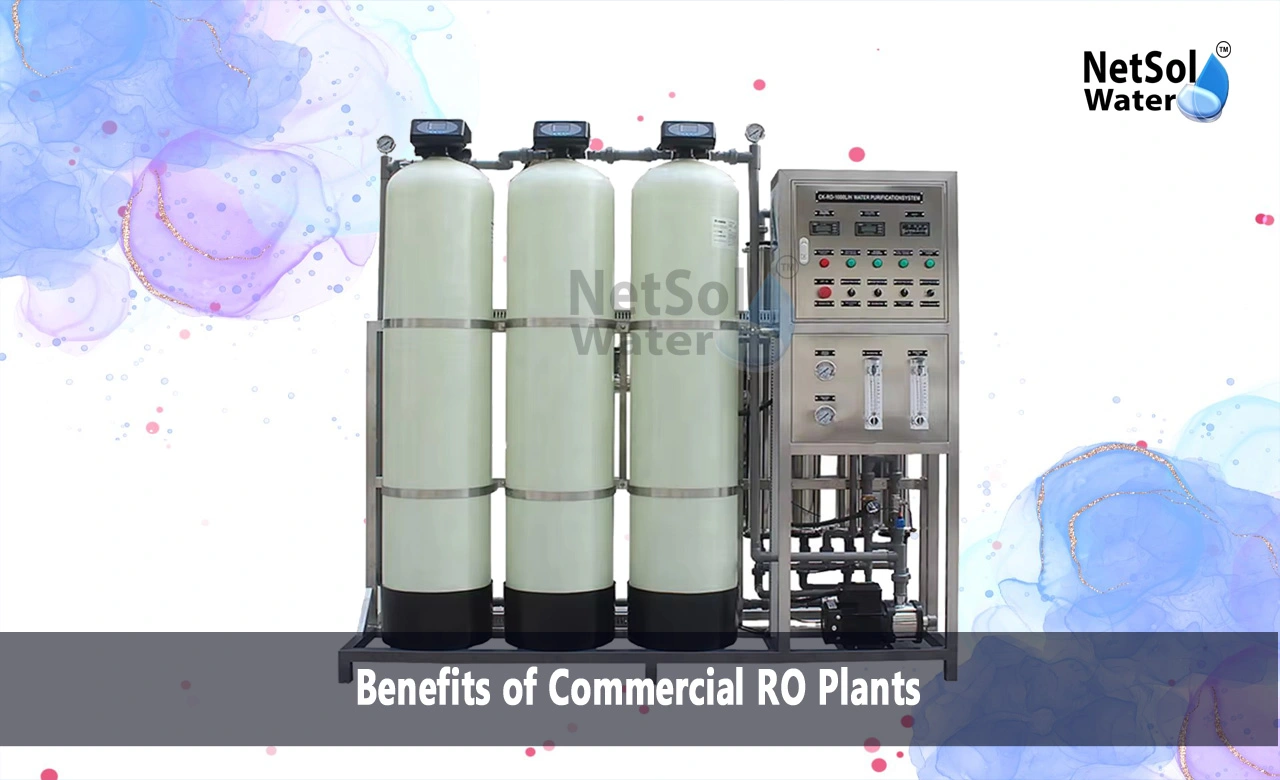What are the Benefits of Commercial RO Plants?
Fresh, clean water is an essential resource for commercial operations across sectors spanning food and beverage production, hospitality services, manufacturing processes, and more. However, available surface and groundwater supplies often cannot meet the stringent purity requirements these facilities demand. Contaminants like dissolved salts, microbes, and trace chemicals can impact product quality, impede equipment performance, create compliance risks, or require extensive pretreatment before use.
Commercial reverse osmosis (RO) desalination plants provide a proven solution for delivering a consistent supply of high-purity process water on-site from previously unsuitable brackish, wastewater, or even seawater sources. In this blog, we explore the extensive advantages and value-added benefits commercial RO plants create – from cost savings and sustainability gains to new water source accessibility. As freshwater supplies decline amid population growth and climate change stressors, investing in an RO plant is increasingly compelling for commercial enterprises reliant on ultra-pure water streams.
Unparalleled Water Purification
At its core, RO is a membrane separation technology able to remove over 99% of most contaminants from feedwater. This exceptional purification performance includes:
1: Salt rejection over 99.5% for brackish and seawater desalination
2: Removing 95-99% of most dissolved organic compounds
3: Eliminating 100% of particles, colloids, bacteria, and viruses
4: Reducing most heavy metal and radionuclide levels below detection
Such comprehensive contaminant removal ensures commercial facilities receive pristine water streams aligning with even the most stringent purity standards. RO permeate often requires minimal further treatment for compliance.
Alternative Water Source Utilization
With conventional freshwater supplies increasingly scarce or contaminated in many locales, RO desalination unlocks access to lower-quality alternative sources once deemed unusable:
1: Inland brackish groundwater resources
2: Municipal wastewater effluent streams
3: Coastal or transported seawater
4: Industrial process waters and wastewaters
Rather than competing for limited potable freshwater supplies, commercial RO plants can tap these abundant lower-quality sources on-site to achieve supply resilience and independence.
Operational and Economic Advantages
Beyond ensuring water quality compliance, commercial RO plants create additional operational benefits and cost savings:
1: Mitigating scale, corrosion, and fouling in equipment
2: Extending asset lifetimes and optimizing process efficiency
3: Enabling water reuse/recycling rather than discharge
4: Lowering costs versus trucking in water or pretreatment
5: Reducing chemical usage for boiler/cooling system treatment
6: Creating product quality consistency impossible with varying feedwaters
7: Supply redundancy in case of disruptions to municipal sources
Overall equipment effectiveness, capacity utilization, and product quality/consistency gains unlock significant economic value.
Sustainability and Environmental Stewardship
Commercial RO desalination aids businesses in reducing their environmental footprint while future-proofing water supplies:
1: Displacing use of rapidly depleting freshwater resources
2: Enabling beneficial reuse of wastewaters as process supply
3: Minimizing liquid discharge volumes requiring disposal
4: Avoiding greenhouse gas emissions from water transport
5: Lessening vulnerabilities to climate change water cycle disruptions
6: Decentralized, modular systems provide resilient local sources
7: Some facilities sell or donate concentrated RO brine streams
Water-intensive sectors like agriculture, energy production, manufacturing, and hospitality can improve water use sustainability.
Regulatory Compliance and Brand Protection
With water quality regulations continually tightening, commercial RO systems help insulate facilities from risks of:
1: Product recalls or liability from contaminants
2: Regulatory fines from exceeding pollutant discharge limits
3: Supply constraints if freshwater becomes locally restricted
4: Reputational damages from unsustainable water practices
RO desalination allows proactive commercial enterprises to emphasize environmentally conscious sourcing and commitment to ethical water stewardship.
Additional Advantages
Beyond the core benefits above, commercial RO plants offer further valuable characteristics:
1: Modular, expandable systems enable flexible capacity growth
2: Compact footprint minimizes facility area required
3: Low operator attention needed for automated steady-state operation
4: Proven long membrane element service lifetimes over 5-7 years
5: Straightforward access to RO equipment, services, and consumables
6: Onsite generation option allows consistent water costs immune to rate hikes
While capital investments are significant, overall lifecycle costs for RO plants tend to reach compelling payback periods.
Overcome Disadvantages Through Proper Implementation
Although RO desalination introduces concentrated brine waste streams requiring disposal or treatment, technological advances provide solutions:
1: Emerging brine concentration and crystallization approaches minimize liquid volumes
2: Combining multi-effect distillation or electrodialysis enables near-zero liquid discharge
3: Extensive R&D into beneficial salt extraction and reuse continues
4: Emerging regulations may soon mandate industrial brine treatment anyway
Moreover, capital and operating costs for RO plants continue declining steadily thanks to:
1: Optimized system designs with energy recovery devices
2: Development of higher permeability, lower fouling membrane materials
3: Improvements in pretreatment methods reducing chemical usage
4: Digital monitoring/automation minimizing manual oversight needs
5: Sophisticated modelling tools enabling predictive maintenance/control
With proper management, commercial RO plants can yield high-value purified water economically and sustainably.
Conclusion
Across industries, commercial operations increasingly find themselves backed into a challenging corner, juggling goals of ensuring high-purity, consistent water supplies, practising corporate sustainability/stewardship, complying with ever-tightening regulations, managing long-term water resilience, and controlling operational costs/risks. Investing in an on-site or nearby reverse osmosis desalination facility provides a powerful solution that comprehensively addresses all these priorities.
The extensive benefits unlocked by commercial RO plants make them invaluable tools as freshwater scarcity risks escalate globally. From virtually unlimited alternative water source accessibility to unsurpassed contaminant removal to sustainability/compliance advantages, the value proposition is robust. While implementation specifics like concentrate management, system sizing, and operations merit careful analysis – the advantages consistently outweigh the drawbacks.
Facilities incorporating RO plants into their long-term water sourcing strategy gain resilience against supply volatility, hedge against future regulatory shifts, enhance environmental branding and reinforce core operational performance. RO desalination is swiftly cementing itself as an indispensable technology supporting business continuity and adaptation to a water-constrained world. Companies wisely investing in commercial RO plants will be well-positioned to thrive regardless of what water challenges unfold.
To explore customised commercial RO plants, Industrial RO plants, ETP or STP solutions for your needs in your areas and nearby regions, contact Netsol Water at:
Phone: +91-965-060-8473Email: enquiry@netsolwater.com



